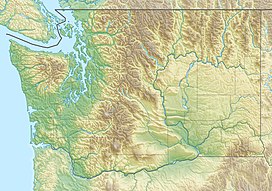| Cowboy Mountain | |
|---|---|
 Cowboy Mountain, north aspect | |
| Highest point | |
| Elevation | 5,853 ft (1,784 m)[1] |
| Prominence | 773 ft (236 m)[1] |
| Parent peak | Big Chief Mountain (5,858 ft)[1] |
| Isolation | 1.9 mi (3.1 km)[2] |
| Coordinates | 47°43′56″N 121°06′09″W / 47.732218°N 121.102552°W[1] |
| Geography | |
| Country | United States |
| State | Washington |
| County | King |
| Parent range | Chiwaukum Mountains Wenatchee Mountains Cascade Range |
| Topo map | USGS Stevens Pass |
| Climbing | |
| Easiest route | class 2 Scrambling |
Cowboy Mountain is a 5,853-foot-elevation (1,784 meter) mountain summit located in northeast King County of Washington state.[3] It is situated at Stevens Pass, on land managed by Mount Baker-Snoqualmie National Forest. This mountain is best known for ski runs on its north slopes which are part of the Stevens Pass Ski Area. Cowboy Mountain is part of the Chiwaukum Mountains, which are a subset of the Cascade Range. Its nearest higher neighbor is Big Chief Mountain, 1.9 mi (3.1 km) to the northeast, and the Pacific Crest Trail passes through the saddle between these two mountains.[1] Precipitation runoff from the peak drains into headwaters of the Tye River, which in turn is a tributary of the Skykomish River. The longest railroad tunnel in the United States, the Cascade Tunnel, was bored directly under Cowboy Mountain, as a response to deadly avalanches that threatened trains of the Great Northern Railway. The deadliest avalanche in the history of the United States, the 1910 Wellington avalanche, occurred approximately two miles west of Cowboy Mountain.
- ^ a b c d e "Cowboy Mountain, Washington". Peakbagger.com.
- ^ "Cowboy Mountain - 5,853' WA". listsofjohn.com. Retrieved 2020-07-02.
- ^ "Cowboy Mountain". Geographic Names Information System. United States Geological Survey, United States Department of the Interior. Retrieved 2020-07-02.


